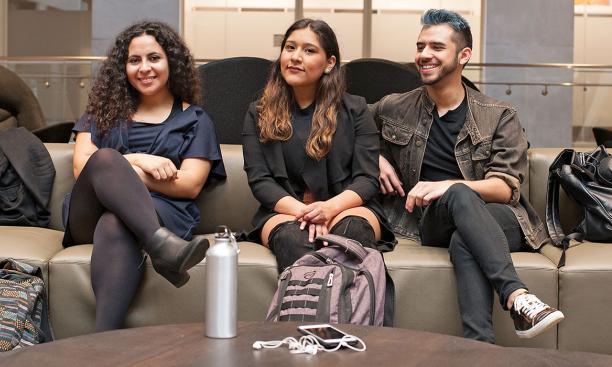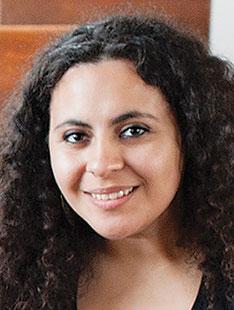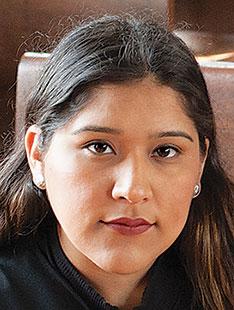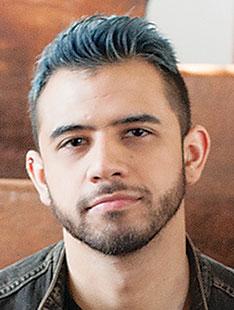
As Congress debated the future of immigration reform and the Deferred Action for Childhood Arrivals (DACA) program last month, PAW sat down with three of the 15 DACA recipients, also known as Dreamers, who are enrolled at Princeton. Here are their stories.
Soraya Morales Nuñez ’18
Grand Junction, Colo.
A politics major pursuing a certificate in Latin American studies; her family came to the U.S. in 1999 to escape the violence in Juarez, Mexico.
What’s your family like?
It’s me and three brothers: two older and one younger. My mom worked multiple minimum-wage jobs. She didn’t finish middle school in Mexico, so she didn’t have the credentials to pursue a higher profession. She worked all the time. I was with my grandma a lot growing up. My mom really valued education. Because of her, [my siblings and I] were able to go to college. And we’re the only people within our family who have pursued higher education.
How has DACA helped you?
The executive order came at a very pivotal moment in my life — I was about to turn 16. My mom had gotten sick a few years before — she was diagnosed with cancer in 2008, and she wasn’t able to work afterward.
That was really scary. And then when DACA was announced, I was able to get a job and help provide for my family. With DACA I got a Social Security number and an employment-authorization card, and I began working at the public library.
What was it like when you were accepted to Princeton?
I was in shock. I couldn’t believe I got into Princeton. It made me realize that there are people out there who don’t know me but who believe in me and see me as much more than an immigrant. They see my potential as a human.
What are your hopes and fears?
It’s hard to not be skeptical. Because politicians say, “Oh, we care about the Dreamers,” but sometimes it feels like we’re just another item on their political agenda. There may be a bill passed that is somewhat helpful, but I think that for actual sweeping immigration reform to happen, it’s going to take someone from my generation to come into office.
Your dreams for the future?
I want to go to law school. I’ll be working as a project analyst at a law firm in Boston for two years, and then the plan is to apply to law school. I think a joint MPA/JD program would be neat. In the long term, I either want to practice civil-rights law or work in some capacity in U.S.-Mexico relations — maybe even go back to Mexico and work there.
What should people know about you?
I’ve been thinking a lot about the kind of legacy that I want to leave at Princeton. Alumni really care about Princeton — many of them found a home here. And I want people to know that I found that same home here. I look forward to also contributing to this community long after I leave in a lot of the same ways that they have, maybe sitting on the board of trustees or donating in some capacity.
María Perales Sánchez ’18
Houston, Texas
A Woodrow Wilson School major pursuing certificates in Latin American studies and Latino studies; her father had been crossing the border to work construction jobs since the 1980s. In 2004, she and her sisters moved to the United States.
What was it like growing up in the U.S.?
I really enjoyed being able to go to school. I remember being confronted with discrimination in fourth grade and realizing that a lot of the teachers saw me differently. I was in ESL, and they expected our class to be the one that created trouble and did not perform well. That really affected me.
When did you realize that you wanted to go to Princeton?
I dreamed that Princeton was going to be my school after I read about Princeton’s motto, “Princeton in the nation’s service and the service of all nations,” and I really connected with that motto.
What was it like for your family when you were admitted?
My dad didn’t really know what it entailed at first. But then we went to a scholarship dinner, and we were sitting at a table with the donors of the scholarship, and my dad had done flooring work for the donors, so they had already met. And for my dad to be sitting at the same table, with the same standing as someone who had been his boss — that was an amazing moment for him.
What are your hopes and fears?
I hope that there’s a permanent solution this year for immigrants. You never feel fully safe if your family isn’t safe. Citizenship made for [Dreamers] isn’t going to take away the fact that you’re worried about your family members being deported.
Your dreams for the future?
I’m in the process of pursuing law school. First I’d like to be an immigration lawyer, providing direct services for a nonprofit. And then I want to go into impact litigation, which is another form of immigrant-rights litigation. Eventually, I want to write policy memos and policy papers regarding immigration.
Joel Martinez GS
Houston, Texas
A third-year Ph.D. student in the psychology department and the Woodrow Wilson School; Martinez and his mother moved to Texas when he was 4. He did not learn about his status until he was in high school.
What was it like when you learned you were undocumented?
I grew up in a low-income — close to poverty — household. It was kind of par for the course, like “oh, well, another thing to add on.” And in Houston, I think, there’s a lot of communities that are undocumented, or mixed citizenship, with Hispanic/Latino families. People will do whatever it takes to survive, and that’s what I thought I was going to have to do.
And this is a unique part of my story — I’m gay, and when I was younger I met the older gay crowd and one of them took me under his wing. I considered him my guardian. And he was the reason I was even able to go to the University of Texas, Austin, at all. He advocated for me — if I needed financial aid, he would call the financial-aid office and say, “You need to give this boy money.”
How has DACA helped you?
Texas had a law that stated that undocumented people — anyone, really — could get in-state tuition as long as they have a residence in Texas. And so I was able to go to UT, Austin.
And then one week before I was going to graduate, my guardian passed away. He was the only way I was able to afford living in Austin because he would send me an allowance. And so aside from having to grieve that, there was also the issue of “now I have no means of living.” That was in May 2013, and then DACA [took effect] in June or July. I applied for it, and I basically got my ability to work.
So I was able to stay in Austin as a lab manager and support myself. The job was at UT, and it was in a neuroimaging lab with children, and I think that’s a big part of what got me [to Princeton].
What obstacles have you faced as a low-income student at Princeton?
When I first got here, it was surreal. During my interview weekend as a prospective student, there was a dinner.
All of the grad students and prospective graduate students sat together, and the only chair left was with the professors. And so I had to sit at their table as a prospective student. When you come from a background like mine, they don’t teach you how to act in these spaces.
For people who come from backgrounds like mine, hardships are taken as a given, and so we don’t talk about them. But coming into spaces like this, [hardships] are very prominent. And so it was like, “Do I talk about my undocumentedness?” It’s these little decisions that you really have to think about.
What are your hopes and fears?
My hope is that we can pass something that legalizes undocumented people, but in ways that don’t leave out other people. Like if I try to support the Dreamer narrative — the idea that there are these excellent immigrants who should be here because they contribute to our nation — if I play into that, I’m leaving out people like my mom who are just as hard-working, but are not seen as legitimate because it’s not prestigious. I don’t feel like I deserve to be here any more than she does.
Your dreams for the future?
I’m doing a double Ph.D. in social policy. I love research, but I also see academia as not being activist enough. Can I use my research and do something practical with it that affects people’s lives? I don’t know what kind of job that would be, but if it doesn’t exist, I’ll forge it.
Interviews conducted and condensed by A.W.



